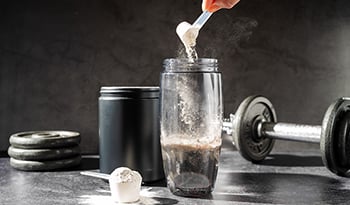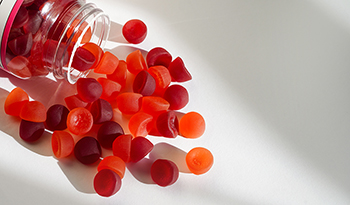TMG-täydennyksen edut

TMG on suosittu lisäys moniin urheilujuomiin ja -lisäravinteisiin, jotka tukevat urheilijoita heidän terveys- ja kuntomatkoillaan. Monet ihmiset eivät tiedä, että TMG:llä voi olla myös muita terveyshyötyjä, jotka tukevat yleistä terveyttä ja hyvinvointia.
Mikä on TMG?
Trimetyyliglysiini, joka tunnetaan myös nimellä TMG, betaiini tai vedetön betaiini, on molekyyli, joka valmistetaan kehossa ravintoaineesta koliinista. TMG sai nimensä, koska sen ulkonäkö on samanlainen kuin aminohappo glysiinin ulkonäkö, johon on liitetty vielä 3 metyyliryhmää.
TMG: tä ei pidä sekoittaa betaiini HCL: ään. Vaikka näillä kahdella molekyylillä voi olla joitain yhtäläisyyksiä, betaiini HCL: ää käytetään useimmiten tukemaan ruoansulatusta auttamalla lisääntynyttä suolahapon tuotantoa mahassa.
TMG toimii ensisijaisesti metyylin luovuttajana auttaakseen tukemaan terveitä homokysteiinitasoja kehossa. Homokysteiini on kehossa valmistettu molekyyli, joka on johdettu aminohaposta metioniinista. Homokysteiini voidaan kierrättää takaisin metioniiniksi tai muuntaa toiseksi aminohapoksi, kysteiiniksi, käyttämällä vitamiineja, kuten B12-vitamiinia ja folaattia.
Korkeat homokysteiinitasot on yhdistetty lisääntyneeseen migreenin, dementian, neurovaskulaaristen sairauksien ja sydän- ja verisuonisairauksien, kuten ateroskleroosin, riskiin.
Vaikka korkeat homokysteiinitasot on yhdistetty huonoon terveyteen, tila voi joskus ilmetä ilman oireita. Kun oireita ilmenee, ne liittyvät yleensä folaatin, B6-vitamiinin ja B12 puutteeseen, johon voi kuulua väsymys, laihtuminen, pistely tai tunnottomuus, lihasheikkous ja ärtyneisyys.
Muita häiriöitä, jotka on yhdistetty korkeaan homokysteiinitasoon, ovat osteoporoosi, heikko kilpirauhasen toiminta, Alzheimerin tauti ja jopa skitsofrenia.
Tutkimukset viittaavat siihen, että TMG-lisäravinteet voivat auttaa alentamaan homokysteiinitasoja ja tarjoamaan muita terveyshyötyjä. TMG-lisäravinteita käytetään usein sydän- ja verisuonitautien ja lihasten terveyden tukemiseen. TMG-lisäainetta voidaan käyttää myös terveellisen verensokerin tukemiseen ja jopa terveellisen painon edistämiseen.
TMG: n edut
Verenpaineen tuki
Maailman terveysjärjestön mukaan maailmanlaajuisesti yli miljardi 30—79-vuotiasta aikuista kamppailee korkean verenpaineen kanssa. Vielä huolestuttavampaa on, että jopa 46% aikuisista, joilla on korkea verenpaine, ei ehkä edes tiedä, että heillä on sairaus.
Diagnosoimaton ja hallitsematon verenpaine voi johtaa sydänkohtaukseen ja aivohalvaukseen.
Koska korkea verenpaine on merkittävä tekijä varhaisissa kuolemissa maailmanlaajuisesti, terveen verenpaineen tukeminen on välttämätöntä. TMG voi pystyä edistämään terveellistä verenpainetta.
Yksi pitkäaikainen yhteisöpohjainen kohorttitutkimus keskittyi seerumin TMG-tasojen ja korkean verenpaineen kehittymisen riskin väliseen suhteeseen keski-ikäisillä ja vanhemmilla aikuisilla.
Tutkimukseen osallistui yli 1000 miestä ja naista ja havaittiin, että korkeampi seerumin TMG-arvo liittyi pienempään riskiin sairastua korkeaan verenpaineeseen. Tutkimuksessa havaittiin myös, että aikuisilla, joilla oli korkeampi seerumin TMG-taso, oli alhaisempi systolinen ja diastolinen verenpaine kuin aikuisilla, joilla oli alhainen TMG-seerumitaso.
Vähennä tulehdusta
Vaikka TMG tunnetaan paremmin metyylin luovuttajana, tutkimukset viittaavat siihen, että TMG:llä voi olla myös anti-inflammatorisia vaikutuksia kehossa. Terveet homokysteiinitasot voivat edistää kehon pääantioksidantin, glutationinmuodostumista, mutta kun tasot nousevat liian korkeiksi, terveysongelmia voi syntyä.
Tutkimukset osoittavat, että korkeat homokysteiinitasot voivat johtaa lisääntyneeseen oksidatiiviseen stressiin ja ohjelmoituun solukuolemaan. TMG-lisäravinteet voivat auttaa muuttamaan homokysteiinin takaisin metioniiniksi, mikä vähentää oksidatiivista stressiä.
Yksi poikkileikkaustutkimus, johon osallistui yli 3000 miestä ja naista, keskittyi koliinin, TMG: n ja tulehduksen väliseen suhteeseen. Tutkimuksessa havaittiin, että henkilöillä, jotka olivat ottaneet yli 360 milligrammaa (mg) päivässä, oli 19% alhaisempi seerumin C-reaktiivisen proteiinin taso ja 12% alhaisempi seerumin tuumorinekroositekijä-alfa -taso kuin niillä, joiden saanti oli alle 260 mg päivässä.
Korkeat C-reaktiivisen proteiinin tasot osoittavat suurempia määriä tulehdusta kehossa, kun taas tuumorinekroositekijä-alfa on solulähetys, joka on vastuussa tulehduksen luomisesta kehossa.
Paranna lihasvoimaa
Monet urheilijat pyrkivät optimoimaan suorituskykyään omissa lajeissaan. Tutkimukset viittaavat siihen, että TMG-lisäravinteet voivat auttaa parantamaan lihasvoimaa ja voimaa, erityisesti koulutetuilla urheilijoilla.
Yksi kaksoissokkoutettu satunnainen, lumekontrolloitu tutkimus keskittyi TMG-lisäravinteen vaikutuksiin liikuntakykyyn miehillä, joilla oli vastustuskykyä. Tutkimuksessa miehet jaettiin kahteen ryhmään: toiseen, joka otti TMG-lisäravinteen urheilujuomassa, ja toiseen, joka otti juuri urheilujuoman.
Tutkimuksessa havaittiin, että betaiiniryhmässä olleilla oli lisääntynyt nostetun painon kuormitus ja toistot, jotka suoritettiin 10 sarjan penkkipunnerruksen aikana.
Mielenkiintoista on, että systeemisessä katsauksessa tarkasteltiin 7 tutkimuksen tietoja ja havaittiin, että vain 2 niistä osoitti tuen lisääntyneelle lihasvoimalle TMG-lisäravinteella, joten lisätutkimuksia tarvitaan.
Diabetes
Diabetes on tuhoisa sairaus, joka vaikuttaa miljooniin ihmisiin ympäri maailmaa. Maailman terveysjärjestö arvioi, että diabeteksen aiheuttamien kuolemien määrä kasvoi 3% vuosina 2000-2019.
Tutkimukset viittaavat siihen, että TMG voi tarjota suojaa diabeteksen kehittymistä vastaan. Yhdessä systemaattisessa katsauksessa ja meta-analyysissä, johon osallistui yli 71 000 henkilöä, havaittiin, että korkeammat glysiini- ja TMG-pitoisuudet seerumissa liittyivät pienempään tyypin 2 diabeteksen riskiin.
Toinen kohorttitutkimus keskittyi TMG:hen ja raskausdiabetekseen. Raskausdiabetes on tila, joka aiheuttaa korkeaa verensokeria raskauden aikana. Tutkimukseen osallistui 187 naista, joilla oli kaksoisraskaus, ja havaittiin, että alhaisemmat seerumin TMG-tasot liittyivät suurempaan riskiin sairastua raskausdiabetekseen.
Yhdessä satunnaistetussa kliinisessä tutkimuksessa tarkasteltiin TMG-lisäyksen vaikutuksia henkilöihin, jotka diagnosoitiin lihaviksi ja prediabeetikoiksi. Tutkimukseen osallistui 27 henkilöä, jotka joko ottivat TMG-lisäravintoa tai lumelääkettä 12 viikon ajan.
Tutkimuksessa havaittiin, että paastoverensokeri laski TMG-ryhmässä. Tutkimuksessa havaittiin myös, että käyrän alla oleva insuliinialue pieneni oraalisen glukoosin tai sokerin saannin jälkeen.
Maksan terveys
Tutkimukset viittaavat siihen, että TMG-lisäravinteet voivat auttaa parantamaan maksan terveyttä, erityisesti niille, jotka kärsivät metaboliseen toimintahäiriöön liittyvästä steatohepatiitista (MASH).
Eräässä havainnointitutkimuksessa keskityttiin TMG-lisäyksen vaikutuksiin 10 aikuiselle, jotka kärsivät MASHista. Tutkimuksessa olleet henkilöt ottivat 2 annosta TMG-valmistetta päivittäin 12 kuukauden ajan. Vain 7 kymmenestä aikuisesta suoritti tutkimuksen.
Tutkimuksen lopussa kolmella seitsemästä osallistujasta maksaentsyymien täydellinen normalisointi. Osallistujat havaitsivat myös maksatulehduksen, rasvan kertymisen maksakudoksissa ja maksakudosten paksuuntumisen tai arpeutumisen huomattavan vähenemisen.
Terveellinen painonhallinta
Lihavuus vaikuttaa kroonisiin terveysongelmiin, kuten diabetekseen, aineenvaihduntahäiriöihin ja korkeaan verenpaineeseen. TMG-lisäys voi auttaa vähentämään liikalihavuutta ja ruumiinpainoa.
Yhdessä systemaattisessa katsauksessa ja meta-analyysissä tarkasteltiin 6 tutkimusta, joihin osallistui 195 osallistujaa. Tutkimuksessa havaittiin, että TMG-lisäravinteet vähensivät kehon rasvamassan ja kehon rasvaprosentin kokonaismäärää muuttamatta osallistujan painoindeksiä tai BMI: tä.
Toisessa poikkileikkaustutkimuksessa, johon osallistui yli 3000 osallistujaa, havaittiin, että korkeampi TMG: n saanti ruokavaliosta liittyi normaaliin ruumiinpainoon. Tutkimuksessa selvennettiin, että korkeampi TMG-saanti ruokavaliosta liittyi vähemmän rungon rasvaa ja kehon kokonaisrasvaprosenttiin. TMG-saanti liittyi myös pienempään vyötärön ympärysmittaan. Nämä havainnot koskivat sekä miehiä että naisia.
Ruoat, joissa on paljon TMG: tä
Monissa luonnollisissa elintarvikkeissa on paljon TMG: tä. Elintarvikkeita, joissa on eniten TMG-määrää, ovat täysjyvätuotteet, kuten ohra, vehnänalkio, vehnäleseet, kauraleseet, ruskea riisi ja quinoa.
Muita runsaasti TMG-pitoisia ruokia ovat pinaatti, katkarapu, kampasimpukat, osterit ja punajuuret. TMG: tä voidaan löytää pienempiä määriä munista ja maidosta.
TMG-lisäravinteen sivuvaikutukset ja huomioita
Vaikka TMG valmistetaan kehossa, TMG-lisäosa on vakaa ja luotettava TMG-muoto, jota voidaan käyttää eri muodoissa kehon tukemiseksi.
TMG-lisäravinteet ovat kätevä ja helppo tapa optimoida TMG-saanti. TMG-lisäosa voi olla kapselin, tabletin tai jopa jauheen muodossa nauttimisen helpottamiseksi.
Paras aika ottaa TMG-lisäosa on yleensä aamulla 4—6 unssin (120—180 ml) suositellun nesteen kanssa. TMG voidaan parhaiten ottaa aterian, kuten aamiaisen, kanssa, koska se voi lisätä haiman ruoansulatusentsyymien eritystä ja tuotantoa.
TMG-lisäravinteiden ottaminen tyhjään vatsaan voi aiheuttaa pahoinvointia, turvotusta tai ruoansulatuskanavan epämukavuutta.
TMG: tä otetaan usein B6-, B12- ja folaatin tai foolihapon kanssa synergistisen vaikutuksen aikaansaamiseksi.
Useimmat tutkimukset viittaavat siihen, että TMG-lisäyksen hyötyminen kestää vähintään 14 päivää. Tämä aikataulu voi vaihdella otetun TMG-annoksen ja tilan vakavuuden mukaan. Monet tutkimukset seurasivat osallistujia jopa 6 viikkoa tai pidempään.
Nouto
TMG-lisäravinteen edut vaihtelevat sydämen terveyden edistämisestä ja tulehduksen vähentämisestä terveiden verensokeritasojen tukemiseen ja terveelliseen painonhallintaan. TMG voi auttaa edistämään yleistä terveyttä ja hyvinvointia.
Lähteet:
- Abdelmalek M.F., Angulo P., Jorgensen RA, Sylvestre PB, Lindor KD (2001). Betaiini, lupaava uusi aine potilaille, joilla on alkoholiton steatohepatiitti: Pilottitutkimuksen tulokset. Olen. J. gastroenteroli. 96 (9), 2711—2717. 10.1111/j.1572-0241.2001.04129.x
- Arumugam MK, Paal MC, Donohue TM Jr, Ganesan M, Osna NA, Kharbanda KK. Betaiinin hyödylliset vaikutukset: kattava katsaus. Biologia (Basel). 2021; 10 (6) :456. Julkaistu 2021 22. toukokuuta. doi:10.3390/biology10060456
- Ataizi S, Ozkoc M, Kanbak G, et ai. Betaiinin ja omega-3-lisäyksen mahdollinen suojaava rooli traumaattisessa aivovauriossa. Ann Ital Chir. 2019; 90:174-181.
- Detopoulou P, Panagiotakos DB, Antonopoulou S, Pitsavos C, Stefanadis C.Ruokavalion koliinin ja betaiinin saanti suhteessa tulehdusmerkkiaineiden pitoisuuksiin terveillä aikuisilla: ATTICA-tutkimus. Am J Clin Nutr. 2008; 87 (2): 424-430. doi: 10.1093/ajcn/87.2.424
- Diabetes.Maailman terveysjärjestö. https://www.who.int/news-room/fact-sheets/detail/diabetes
- Dobrijević D, pastori K, Nastić N, et ai. Betaiini toiminnallisena ainesosana: aineenvaihdunta, terveyttä edistävät ominaisuudet, ruokalähteet, sovellukset ja analyysimenetelmät. Molekyylit. 2023; 28 (12): 4824. Julkaistu 2023 17. kesäkuuta doi:10.3390/molecules28124824
- Gao X, Wang Y, Randell E, et ai. Suuremmat koliinin ja betaiinin saantit ruokavaliossa liittyvät parempaan kehon koostumukseen Newfoundlandin aikuisväestössä Kanadassa. PLoS One. 2016; 11 (5): e0155403. Julkaistu 2016 11. toukokuuta. doi:10.1371/journal.pone.0155403
- Gao X, Zhang H, Guo XF, Li K, Li S, Li D.Betaiinin vaikutus kehon rasvan vähentämiseen - Satunnaistettujen kontrolloitujen tutkimusten systemaattinen katsaus ja meta-analyysi. Ravinteet. 2019; 11 (10): 2480. Julkaistu 2019 16. lokakuuta. doi:10.3390/nu11102480
- Gong X, Du Y, Li X, et ai. Äidin plasman betaiini keskiraskauden aikana liittyi vähentyneeseen GDM-riskiin kaksosraskaudessa: kohorttitutkimus. Diabetes Metab Syndr Obes. 2021; 14:2495-2504. Julkaistu 2021 3. kesäkuuta doi:10.2147/dmso.s312334
- Grizales AM, Patti ME, Lin AP, et ai. Betaiinin metaboliset vaikutukset: Satunnaistettu kliininen tutkimus betaiinilisäaineesta prediabeteksen hoidossa. J Clin Endocrinol Metab. 2018; 103 (8): 3038-3049. doi: 10.1210/jc.2018-00507
- Hermann A, Sitdikova G.Homokysteiini: biokemia, molekyylibiologia ja rooli sairaudessa. Biomolekyylit. 2021; 11 (5): 737. Julkaistu 2021 15. toukokuuta. doi:10.3390/biom11050737
- Huang RZ, Ma JF, Chen S, et ai. Seerumin betaiinin yhteydet verenpaineeseen ja verenpaineen esiintyvyyteen keski-ikäisillä ja vanhemmilla aikuisilla: prospektiivinen kohorttitutkimus. Elintarvikefunktio 2023; 14 (10): 4881-4890. Julkaistu 2023 22. toukokuuta. doi:10.1039/d3fo00325f
- Verenpainetauti. Maailman terveysjärjestö. https://www.who.int/news-room/fact-sheets/detail/hypertension
- Ismaeel A.Betaiinilisäyksen vaikutukset lihasvoimaan ja voimaan: järjestelmällinen katsaus. J. Voima Cond. Res.2017; 31:2338—2346. doi: 10.1519/JSC.0000000000001959.
- Morze J, Wittenbecher C, Schwingshackl L, et ai. Metabolomiikka ja tyypin 2 diabeteksen riski: päivitetty systemaattinen katsaus ja meta-analyysi prospektiivisista kohorttitutkimuksista. Diabeteksen hoito. 2022; 45 (4): 1013-104. doi: 10.2337/dc21-1705
- Olthof MR, van Vliet T, Boelsma E, Verhoef P. Pieniannoksinen betaiinilisä johtaa välittömään ja pitkäaikaiseen plasman homokysteiinin alentamiseen terveillä miehillä ja naisilla. Jutr. 2003; 133 (12): 4135-4138. doi: 10.1093/jn/133.12.4135
- Schwab U, Törrönen A, Toppinen L, et ai. Betaiinilisäys vähentää plasman homokysteiinipitoisuuksia, mutta ei vaikuta kehon painoon, kehon koostumukseen tai lepoenergiankulutukseen ihmisillä. Am J Clin Nutr. 2002; 76 (5): 961-967. doi: 10.1093/ajcn/76.5.961
- Poika P, Lewis L.Hyperhomocysteinemia. [Päivitetty 2022 8. toukokuuta]. Julkaisussa: StatPearls [Internet]. Treasure Island (FL): StatPearls Publishing; 2024 tammikuu-. Saatavana osoitteesta: https://www.ncbi.nlm.nih.gov/books/NBK554408/
- Trepanowski JF, Farney TM, McCarthy CG, Schilling BK, Craig SA, Bloomer RJ. Kroonisen betaiinilisän vaikutukset liikuntakykyyn, luustolihaksen happisaturaatioon ja niihin liittyviin biokemiallisiin parametreihin resistenssikoulutetuilla miehillä. J Vahvuusmääräys 2011; 25 (12): 3461-3471. doi: 10.1519/JSC.0b013e318217d48d
- Uelannin pääministeri. Koliini ja betaiini terveydessä ja sairauksissa. J Inherit Metab joulukuu 2011; 34 (1): 3-15. doi: 10.1007/s10545-010-9088-4
- Zeisel SH, Mar MH, Howe JC, Holden JM. Koliinia sisältävien yhdisteiden ja betaiinin pitoisuudet tavallisissa elintarvikkeissa [julkaistu korjaus ilmestyy julkaisussa J Nutr. 2003 syyskuu; 133 (9) :2918]. Jutr. 2003; 133 (5): 1302-1307. doi: 10.1093/jn/133.5.1302
- Zhao G, He F, Wu C, et ai. Betaiini tulehduksessa: mekaaniset näkökohdat ja sovellukset. Edessä Immunol. 2018; 9:1070. Julkaistu 2018 24. toukokuuta. doi:10.3389/fimu.2018.01070
VASTUUVAPAUSLAUSEKE:Tämän hyvinvointiblogin tarkoituksena ei ole tarjota diagnooseja...
















































































 Sisällysluettelo
Sisällysluettelo















